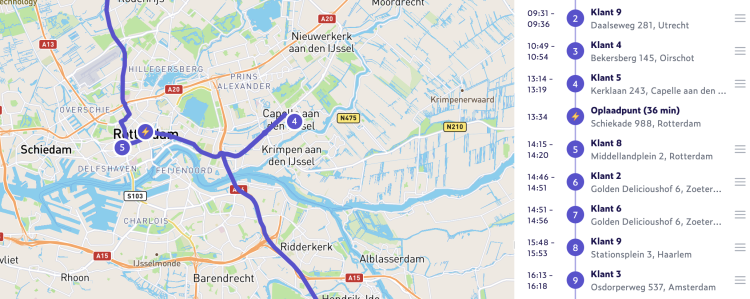 ETA: abbreviation for "Estimated Time of Arrival."
ETA: abbreviation for "Estimated Time of Arrival."
58% more electric vans sold by 2022

Electric delivery vans in the Netherlands
The most sold electric vans are of the Nissan brand (22.2%), where they are followed by Renault (18.3%). This is according to RDW figures. In 2022, the most sold electric vans are of the Opel brand. They sold 628 electric vans so far. Followed by Peugeot with 511 e-Partners, e-Experts and E-boxers sold in 2022. RouteLogic surveyed 1,347 companies on their considerations when purchasing an electric van.

Why isn't every business owner opting for an electric van yet?
In fact, according to research by RouteLogic, it appears that not every business owner is eager to make the move to electric delivery vans. In a survey conducted among companies that deliver their own orders, they give a number of reasons for this.
Reason 1: the high purchase price
67% of the respondents indicated that they would not make the purchase yet because of the higher purchase price. On average, the price of an electric delivery van is 30-50% higher than a gasoline/diesel variant. Subsidies make the difference smaller but do not bridge the total price difference.
Reason 2: the limited range.
27% see the range as the biggest bottleneck. The range of an average compact electric van is 250-300 km. However, that is without load and on a summer day.

Reason 3: charging infrastructure
The limited charging infrastructure is also a reason for not purchasing an electric bus for the time being for 18% of business owners. They indicate that they simply drive too long routes and charging in between trips is not an option for them at the moment. Entrepreneurs who do drive electric buses indicate that the charging infrastructure also presents them with a dilemma. Adapt the routes to the range or charge along the way?
Adjusting routes is cited as the solution in 68% of cases. For example, DHL drives from the depot directly to a service area with a high parcel density. In this area, many packages are delivered to addresses that are close together, thus limiting the number of kilometers to be driven. Once back at the depot, the vehicle can be recharged overnight so that it is ready for the next day.
32% of entrepreneurs who drive electric delivery vans choose to recharge on the road. Easy as it is, it's not easy yet. To recharge a van a little quickly, you have to rely on so-called fast chargers. A delivery van is 80% charged again in 30 minutes. In the Netherlands there are now over 3,000 fast chargers. However, cars also charge here, so if the fast charger is occupied you have to wait a while and your route can be delayed.

Main reasons for doing switch to the electric van
The survey also asked when business owners would make a switch. 65% of business owners indicated that as soon as the total cost of ownership comes close to or becomes lower than a diesel or gasoline van they will definitely switch.
Another important reason is changing regulations. 30 municipalities have agreed to lock city centers for all vans with exhaust starting in 2025. Business owners are already anticipating this by converting part of their fleets to electric vehicles in the coming years. 44% of business owners say they expect this to be a reason why they should switch.
Another interesting motivation from the survey is that a van requires little maintenance. This is largely due to the electric motor. This is because electric motors contain fewer moving parts than an internal combustion engine. For this reason, the amount of maintenance required is a lot less. In addition, there are no oil change costs. 8% of business owners see this as an advantage, but not really a reason to switch.

Green image
Sustainability is no longer an empty slogan for many companies. Customers also expect companies to make a significant contribution to reducing their footprint for the sake of sustainability. 31% of business owners say they are aware of this and want to buy electric delivery vans for that reason. Yet for now, the counter-arguments win out over the reasons to switch to an electric delivery van.
Recently, parcel delivery company DHL stated that they want to make the entire last mile in the Netherlands fossil-free by the end of 2022. The last mile is the last phase of the delivery process, where the package leaves the warehouse and reaches the customer. DHL is already betting heavily on electric transport but also uses vehicles that run on HVO-100 diesel. This fuel reduces co2 emissions by up to 90%.
All information about delivery with an electric delivery van in one overview? Take a look at this page.
Related articles
 ETA: abbreviation for "Estimated Time of Arrival."
ETA: abbreviation for "Estimated Time of Arrival."
 ETD: abbreviation for "Estimated Time of Departure."
ETD: abbreviation for "Estimated Time of Departure."
 Planning routes with electric vehicles
Planning routes with electric vehicles